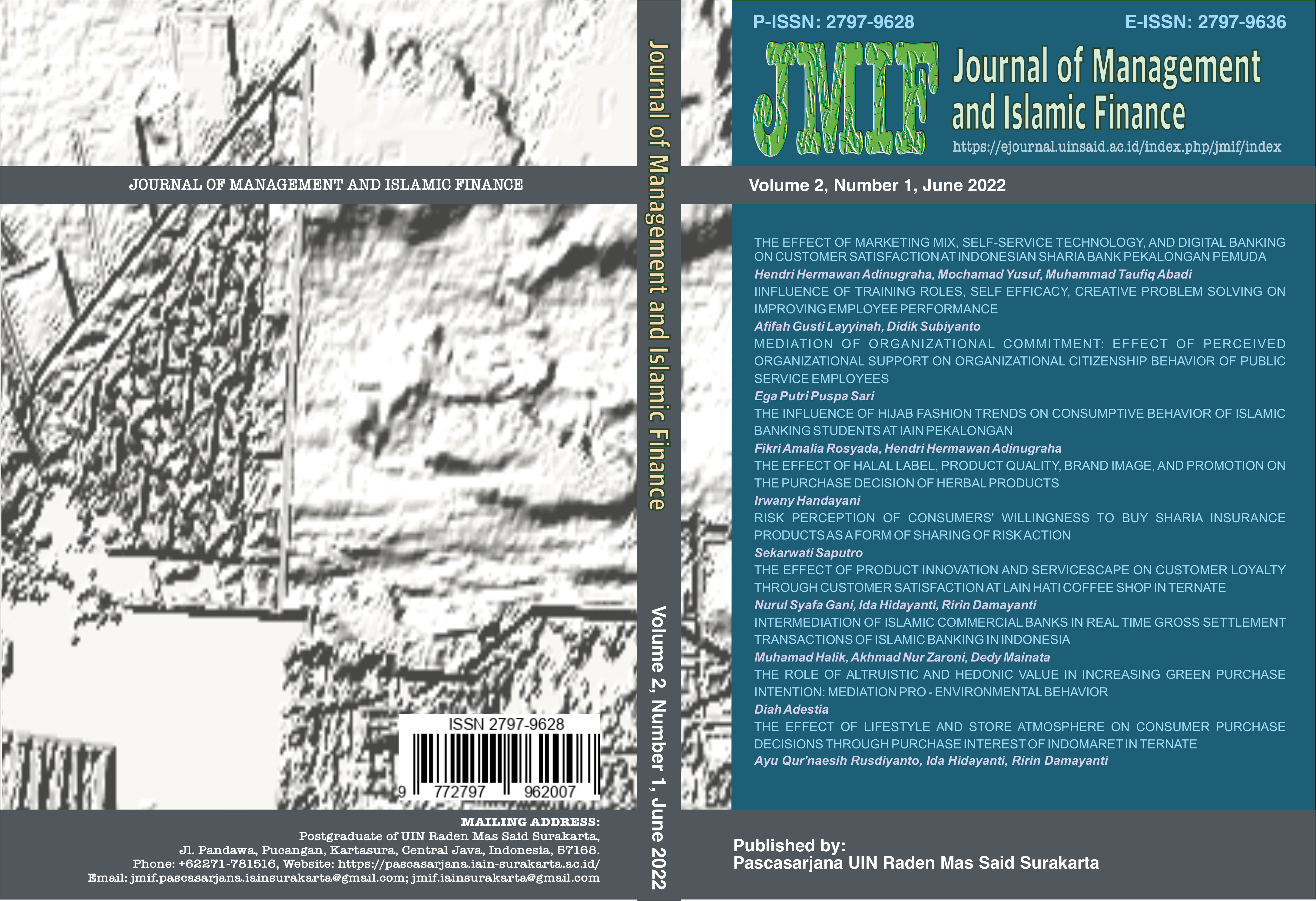THE INFLUENCE OF HIJAB FASHION TRENDS ON CONSUMPTIVE BEHAVIOR OF ISLAMIC BANKING STUDENTS AT IAIN PEKALONGAN
DOI:
https://doi.org/10.22515/jmif.v2i1.5114Keywords:
Hijab fashion trend, consumptive behavior, female studentAbstract
Fashion is an important thing in the lives of teenagers and adults. Fashion is considered to provide a reflection of each person. The development of the hijab fashion trend is also developing among Muslims, especially among female students. The desire to follow the hijab fashion trend causes extravagant behaviour to support appearance. The purpose of this study is to analyze the effect of hijab fashion trends on the consumptive behaviour of Islamic Banking students at IAIN Pekalongan. The method used in this study was a qualitative method using a phenomenological approach and data collection using the methods of observation, interviews, and documentation. Meanwhile, the research subject was Islamic Banking student taken by purposive sampling method. The results of this study indicate that the hijab fashion trend has a significant influence on the consumptive behaviour of Islamic Banking students. The consumptive behaviour of female students is shown by the hijab worn on campus with various styles that are trends and a waste of buying hijab with the desire to fulfil their fashion style so that they can look attractive when leaving for campus.
Downloads
References
Asmita, D., & Erianjoni. (2019). Perilaku Konsumtif Mahasiswi dalam Mengikuti Trend Fashion Masa Kini (Studi Kasus Mahasiswi Sosiologi FIS UNP). Jurnal Kajian Sosiologi Dan Pendidikan, 2(2), 1–23.
Ayunda, A., Mutmainah, L., & Huda, N. (2018). Analisis Terhadap Perilaku Konsumen Produk Fashion Muslim. JEBA (Journal of Economics and Business Aseanomics), 3(2).
Handayani, R. (2019). Pengaruh Fashion Hijab Terhadap Perilaku Konsumtif Mahasiswa Fakultas Ilmu Sosial Dan Humaniora. 1–9.
Istiani, A. N. (2015). Kontruksi Makna Hijab Fasion Bagi Muslim Blogger Muslim. Jurnal Kajian Komunikas, 3(1), 48–55.
Maryam, S. (2020). Pengaruh Perubahan Trend Jilbab Dan Ketertarikan Fashion Berjilbab Terhadap Perilaku Konsumtif Pada Mahasiswi Universitas Islam Negeri Sulthan Thafa Saifuddin Jambi. 1–9. http://repository.uinjambi.ac.id/id/eprint/3604
Rachma, D. A. (2017). Hubungan Gaya Hidup Hedonis Dengan Perilaku Konsumtif Fashion Pakaian Pada Mahasiswa Jurusan Manajemen Fakultas Ekonomi Angkatan 2015 Uin Maliki Malang. 18–19. http://etheses.uin-malang.ac.id/id/eprint/9357
Rahma, N. (2019). Pengaruh Fashion Hijab Terhadap Perilaku Konsumtif Diperumahan Mega Regency Blok H Rt 01-05 Rw 09 Desa Sukasari, Serang Baru Bekasi. Jurnal Ilmu Ekonomi Syariah, 1(2), 93–100.
Sa’adatunnisa, Arifin, M. Z., & Jelita. (2016). Pengaruh Fashion Hijab Terhadap Perilaku Konsumtif Mahasiswi Fakultas Ekonomi Dan Bisnis Islam Iain Pelangka Raya. Jutnal Al-Qardh, 2(1), 74–89.
Wulandari, S. (2018). Pengaruh Fashion Hijab Terhadap Perilaku Konsumtif Mahasiswi Fakultas Ekonomi Dan Bisnis Islam Uin STS Jambi. http://repository.uinjambi.ac.id/id/eprint/286
Other References
Results of an interview with Anggi Suparti (Islamic Banking Student Class of 2020) on March 19, 2022
Results of an interview with Fatkhul Izzati (Islamic Banking Student Class of 2018) on March 21, 2022
Results of an interview with Fina Nurul Izzah (Islamic Banking Student Class of 2019) on March 21, 2022
Results of an interview with Putri Rahmawati (Islamic Banking Student Class of 2021) on March 21, 2022
Downloads
Published
Issue
Section
Citation Check
License
Copyright (c) 2022 Fikri Amalia Rosyada, Hendri Hermawan Adinugraha

This work is licensed under a Creative Commons Attribution-ShareAlike 4.0 International License.
Authors who publish with this journal agree to the following terms:
- Authors retain copyright and grant the journal right of first publication with the work simultaneously licensed under a Creative Commons Attribution License that allows others to share the work with an acknowledgement of the work's authorship and initial publication in this journal.
- Authors are able to enter into separate, additional contractual arrangements for the non-exclusive distribution of the journal's published version of the work (e.g., post it to an institutional repository or publish it in a book), with an acknowledgement of its initial publication in this journal.
- Authors are permitted and encouraged to post their work online (e.g., in institutional repositories or on their website) prior to and during the submission process, as it can lead to productive exchanges, as well as earlier and greater citation of published work.






